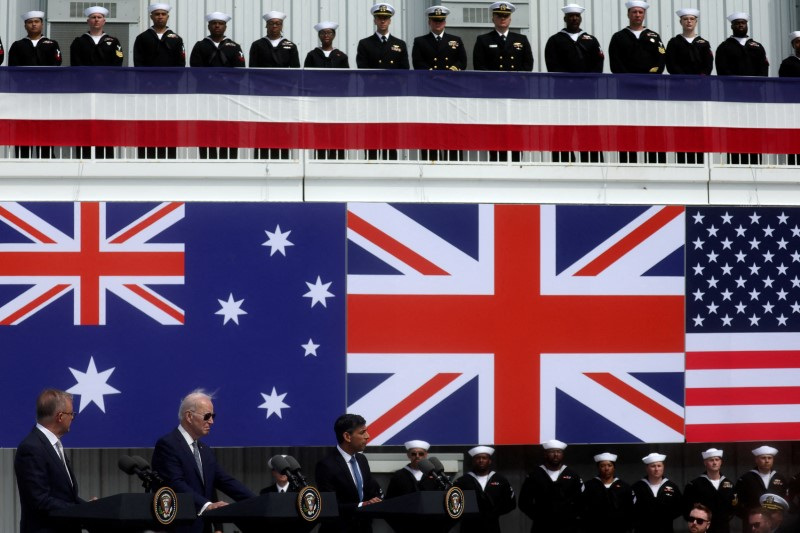By David Brunnstrom and Michael Martina
WASHINGTON (Reuters) -The U.S. State Department told the U.S. Congress on Thursday that Australia, Britain and the United States now have comparable export-control regimes, a significant step needed to facilitate technology sharing and allow the trilateral AUKUS defense pact to move ahead.
AUKUS, formed in 2021 to address shared worries about China's growing power, is designed to allow Australia to acquire nuclear-powered attack submarines and other advanced weapons such as hypersonic missiles.
However, the sharing of closely guarded technology, which is governed by strict U.S. International Trafficking in Arms Regulations (ITAR), has been a hurdle for cooperation.
The 2024 U.S. National Defense Authorization Act (NDAA) required President Joe Biden to determine whether Australia and Britain have export control regimes "comparable to the United States" and thereby qualify for ITAR exemptions.
"Today, the Department of State submitted to the Congress a determination that Australia and UK export control systems are comparable to those of the United States and have implemented a reciprocal export exemption for U.S. entities," the State Department said in a statement.
It said it would publish an interim final rule on Friday to amend ITAR and implement export licensing exemptions for Australia and Britain effective from Sept. 1.
The final rule, however, will include a list of sensitive technologies excluded from ITAR exemptions and analysts say this will likely mean that significant bureaucratic hurdles will still need to be overcome to realize the AUKUS projects.
Earlier on Thursday, Australian Defence Minister Richard Marles nevertheless called the reforms a "generational change" and a British government statement called it a "historic breakthrough."
"These critical reforms will revolutionize defense trade, innovation and cooperation, enabling collaboration at the speed and scale required to meet our challenging strategic circumstances," Marles said in a statement.
A State Department official told reporters that for the U.S., approximately 80% of the value of current commercial defense trade would be covered by the licensing exemptions, increasing the speed and predictability of those transactions.
The U.S. issues around 3,800 defense export control licenses for Australia each year which have taken up to 18 months to approve, while approvals in Britain have taken 100 days.
Australian and U.S. officials said the U.S. State Department will have a 45-day window to decide on the transfer of technologies on the excluded list between governments and industry, and 30 days for government-to-government transfers.
The State Department said a 90-day public comment period for the interim final rule would "allow for further refinement in subsequent rule-making."
It said the aim was "maximize innovation and mutually strengthen our three defense industrial bases by facilitating billions of dollars in secure license-free defense trade."
A draft rule made public at the end of April was hailed as a game-changer by Australia, although some experts on defense export controls said then the exclusion list was so broad as to make the policy changes almost meaningless. Among the exclusions were certain technologies for submarines and hypersonics.
The State Department official said the updated list of exclusions still contained "certain submersible technology, certain undersea acoustics technology" relevant to AUKUS.
However this did not mean they could not be exported. "All it means is that we need to see a license for that before it goes," the official said, adding that the applications would have to be processed within 30 to 45 days.
"We are going to make sure ... that the trade can occur, that it can occur at the speed of relevance, securely," the official said.
The unveiling of the draft in April was followed by a month-long comment period in which industry bodies and defense firms called for the list of exclusions to be narrowed.
The Republican chair of the U.S. House Foreign Affairs Committee Michael McCaul welcomed Thursday's move, but called it long overdue and said "there are still too many items that are critical to fully implementing AUKUS that are not included in this exemption.
"Until the Excluded Technologies List is limited to only a handful of items — as Congress intended — big government regulation will continue to hamper this crucial alliance's ability to truly deter a conflict in the Indo-Pacific," he said in a statement.

In a statement, Eric Fanning, president of the Aerospace Industries Association, said Thursday's announcement signaled "important progress" to boost trilateral defense trade and technology cooperation, although it was "only the first step in setting the rules of the road for AUKUS implementation."
Jeff Bialos, a former senior Pentagon official now a partner at the Eversheds Sutherland law firm, said the details of the final ITAR waiver would be critical as if they were too administratively unwieldy, they would fall into disuse and undermine the aim of enhanced technology cooperation.